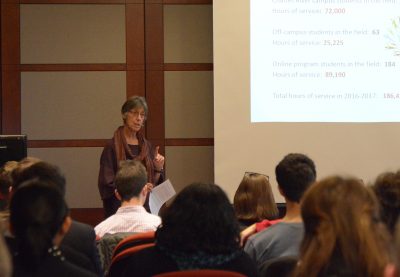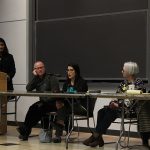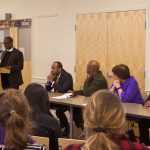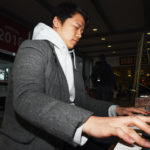
Boston University students, staff and faculty gathered Wednesday afternoon in the Questrom School of Business to learn how BU students play an important role in improving the community in the surrounding Boston area.
The “Reducing Disparities and Promoting Well-Being in Boston: The Role of the BU Community” discussion, hosted by the BU Initiative on Cities, drew approximately 80 community members.
Katharine Lusk, executive director of the IOC, said she hoped the event would shed light on many of BU’s programs, and BU’s role in the city community.
“We really wanted to understand what some of those relationships look like and what those contributions look like,” Lusk said prior to the presentation. “Our focus throughout all of this as the Initiative on Cities, is really trying to say, OK, what are we doing now, but what more could BU be doing.’”
The event consisted of a series of presentations by eight speakers representing different programs on campus, ranging from criminal law clinic, college preparation program to prison education program.
Graham Wilson, the director of the IOC, introduced the event.
“We know that the university is not perfect,” Wilson said. “We know there is more that we could be doing, that we should be doing. We hope that the good work that we are doing will serve as an inspiration to all of us.”
Associate Dean of the School of Law Peggy Maisel gave the first presentation. Maisel focused on the role that law students play in overcoming racial, ethnic and income disparities.
She highlighted many clinical programs law students take part in by doing field work, such as the Criminal Law Clinical Program, the International Human Rights Clinic and the Human Trafficking Clinic.
“We have terrific students who graduate, I hope with a better understanding, who will give back even if they go to work for large law firms or small law firms,” Maisel said. “They’ll have the skills and they’ll give back.”
Danielle Rousseau, an assistant professor of criminal justice in the Metropolitan College, talked about the successes of the BU Prison Education Program.
“Education can be really transformative experience, being on campus but really in the institutions we see these individuals becoming leaders, and leaders among their peers,” Rousseau said. “They get very engaged and involved in other programming.”
Zachary Hobbs, the director of the Community Service Center emphasized the welcoming space, service, education and reflection that the CSC provides.
“Our students are more comfortable having challenging conversations with people who might disagree with them,” Hobbs said.
Hobbs said the CSC is “working with the community, not working for them.”
Assistant Dean of the School of Social Work Trudy Zimmerman spoke about the scope of the programs SSW provides, including programs in mental health, addiction services, housing, schools and family service.
Joanna Brown, a program director in the School of Public Health discussed the BU Activist Lab, which seeks to “educate, innovate, advocate.”
Brown said students are able to stay current in public health skills, come up with solutions to urban health programs and be advocates for public health change. This summer, as part of the SPH Water Squad, students handed out water bottles on the street.
Kathy Lituri, the oral health promotion director in the Henry M. Goldman School of Dental Medicine, said dental students are greatly involved in improving oral health in the greater Boston community.
They provide community-based education in Boston public schools as well as clinical services.
Michael Dennehy, director of the School of Education, said SED’s programs engage underrepresented students in Massachusetts by preparing them for college.
Dennehy also spoke about the crossover of these programs with other institutions on campus such as BU Admissions, STEM Education Initiatives, the Howard Thurman Center for Common Ground and the CSC.
After the presentation, several faculty members said they gained a better understanding of what the university has to offer.
Rachel Reiser, the assistant dean of Questrom, said she previously didn’t know about a lot of these programs.
“Given my focus on undergraduate students, I knew a lot about the Community Service Center and so forth, but I really didn’t know about the scope of the prison program. I certainly didn’t know what the dental school did,” Riser said. “I was really curious and I was honestly overwhelmed by the scope of activities”
Kelly Nguyen, the education program coordinator at the School of Medicine, said she wanted to hear about programs related to her job.
“It’s really great to see that BU is very intent on reaching out to all their departments,” Nguyen said.
Trisha Mah, an academic counselor in the College of Engineering, said she also wanted to learn about programs at BU after working with Boston public high school students.
“I just wanted to see what this institution is up to, what they’re doing for the students, what they’re doing for the City of Boston,” Mah said.




